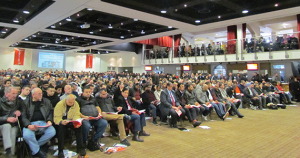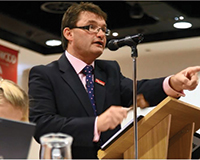 The West Midlands auction market is hot. Everything is up for sale and the sector has become more mainstream than ever, attracting a wider range of buyers with more diverse tastes and finance requirements.
The West Midlands auction market is hot. Everything is up for sale and the sector has become more mainstream than ever, attracting a wider range of buyers with more diverse tastes and finance requirements.
Greater access to funding is helping fuel the buoyant auction sector, both regionally and nationally. In the past year, the number of specialist auction finance providers has grown markedly and these short-term lenders are widening the choices for buyers seeking finance.
With the number of buy-to-let mortgages more than doubling in the past two years to 1,011 different products, according to regional auction specialist CP Bigwood, lenders have been offering loan-to-values of up to 100%, helping residential developments to come forward.
But it is a tale of two sectors. While residential lots are almost overheating, the commercial market is a tad cooler. Paul Giles, head of commercial auctions at Savills, says: “You can easily have 40-80 people per viewing for resi, but for commercial you’re not talking to a large captive audience. The difference is that for the latter, they all have their funding in place.”
So what opportunities are available and which lots are the most popular?
Pretty much anything and everything can be bought at an auction, from dental surgeries, to chip shops and even public conveniences. But by far the most popular lots in the region are vacant homes. Rory Daly, senior partner at Birmingham-based CP Bigwood, says: “The vacant resi sector is almost overheating right now. The market is still challenging in terms of getting stock, but there’s a strong audience for housing.”
Meanwhile, with every council in the land under pressure to slash costs and maximise budgets, more and more local authorities in the Midlands are using auctions to raise cash from their property assets, such as former care homes, outdated offices and homes.
Daly adds: “Much of the surplus local authority stock needs significant improvement, so it is realistically priced and in demand. We regularly achieve premium prices.”
Speaking as the appointed auctioneer for the majority of West Midlands councils, CP Bigwood’s Daly says: “It’s definitely Birmingham that is selling off the most assets. It’s the biggest landlord in the West Midlands.”
But the council does retain some control over what happens to its residential assets. “It sells lots of long leaseholds so it still has long-term control,” Daly adds.
On a national level, leisure has replaced offices as the second-biggest asset class traded at auction, marking a turnaround since the sector lost popularity during the recession, according to the latest Commercial Property Auction Data report.
Traditionally, buyers have tended to be local, but there has been a growing trend for London and South East-based bargain-hunters targeting Midlands auctions to bag a bargain – mirroring what is happening in the wider UK investment market.
CP Bigwood’s Daly says more and more southern investors are showing up at Midlands auctions to take advantage of higher yields and lower-value property prices, offering better value for money.
“Prices are through the roof in London and the South East in both the commercial and residential sectors,” he says. “As a result, canny investors have begun to question continuing to put their money into the capital. They will often pay over the odds, but that’s because, in their terms, returns are typically 8-9% rather than 4-5% in the capital.”
With packed-out auctions, the hammer often comes down on bids well above the asking price. Lots are regularly exceeding asking prices and premiums are being paid.
Daly cites his firm’s July auction, where 123 lots went under the hammer, achieving £14.2m in sales – an 87% success rate. The firm’s September auction also replicated an 87% success rate.
“The previous record of £13m, set in February 2014, has been broken by every auction so far this year,” he says. “The aggregate sales of £54m so far in 2015 are more than we achieved in one year, just five years ago.”
And this trend doesn’t look like changing soon. “Strong auction houses are having a blinding year,” says Daly. “If our remaining two auctions this year are on a par, we will achieve £80m this year.”
Online versus real-life auctions
With buyers’ time at a premium and a trend for London and South East-based purchasers looking to the regions for property bargains, is the convenience of being able to bid remotely becoming increasingly attractive?
Richard Reed, head of property at John Pye Auctions, thinks so. “Our online property auctions run for seven days, so each property is subject to one week in which buyers can make a bid on it,” he says.
But Savills’ head of commercial auctions, Paul Giles, says that although online bids will take off in the future,
the technology is “not there yet”.
“At the moment, people want to see the whites of the eyes of their competitors in the room,” he says. “People don’t feel they have as much control if they are not physically there to see the show of hands.”
John Pye’s Reed believes there has been a clear trend in the West Midlands for competitively valued distressed flats, which provide, or have the potential to provide, high returns.
“In the last six months, we have sold £2.5m worth of stock in Birmingham alone,” he says. “And, typically, we are seeing that 90% of buyers are private investors in this area.”











